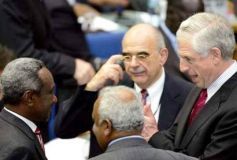UN: Sudan govt could agree peace with southern rebels within two weeks
By BRADLEY S. KLAPPER, Associated Press Writer
GENEVA, Nov 30, 2004 (AP) — The Sudanese government and a southern rebel group will likely agree within two weeks on a peace deal to end their 21-year civil war, a senior United Nations official said Tuesday.

|
|
U.S. Ambassador to the United Nations John Danforth (R) talks with Sudan’s Vice President Ali Osman Mohamed Taha (L) as U.N. envoy to Sudan Jan Pronk (C) during a documents signing ceremony between a Sudanese government official and a negotiator from the rebel SPLM in Nairobi, November 19, 2004. |
Jan Pronk, the world body’s chief envoy for Sudan, said that even though African nation is “poised between peace and conflict,” he is confident the warring parties will be able to reach an accord before a year-end deadline imposed by the U.N. Security Council.
“There will be peace — don’t be skeptical anymore,” Pronk told reporters.
The two sides have agreed to two thirds of the proposed peace accord, he said. The plan would create a new government for southern Sudan, and the leader of the region would be vice president of the whole country.
After 6 1/2 years of power sharing, southern Sudan will be able to choose whether to secede or remain part of a united country.
More than two million people have died — mostly from war-induced famine — during the conflict, which is Africa’s longest-running civil war.
Peace talks on southern Sudan are separate from others focusing on the conflict in Sudan’s western region of Darfur. Fighting in Darfur has driven an estimated 1.8 million people from their homes, while at least 70,000 people, mostly civilians, have died.
Overall, the United Nations needs US$1.5 billion (A?1.1 billion) to support humanitarian and food aid programs in Sudan next year, Pronk said. Some US$600 million (A?451 million) of the money would be spent on programs in Darfur, he added.
The total amount is double what the global body required for its Sudan operations this year.
“Donors have been very generous in 2004 in providing support for humanitarian programs,” Pronk said. “This must continue in 2005.”
However, Pronk said he saw little immediate chance of reaching a peace agreement in the western Darfur region soon.
“Politically it is extremely difficult to solve the problem in Darfur, because the government is a government but the rebel movement is a loose construction of groups,” he said.
That makes it harder for the United Nations to help negotiate a peace accord, because it is difficult to tell if rebel leaders really control the forces on the ground, Pronk said.
But a successful peace settlement in southern Sudan could provide much-needed impetus for peace in Darfur, “because the rebel movement will see it is better to negotiate,” he added.
The southern war has pitted Sudan’s Islamic government against rebels seeking greater autonomy and a greater share of the country’s wealth for the largely Christian and animist south.
In Darfur, where fighting started in February 2003, the government has tried to crush two non-Arab African rebel groups who took up arms to fight for more power and resources. The government responded by backing Arab militias, who are accused of targeting civilians in a campaign of murder, rape and arson.
